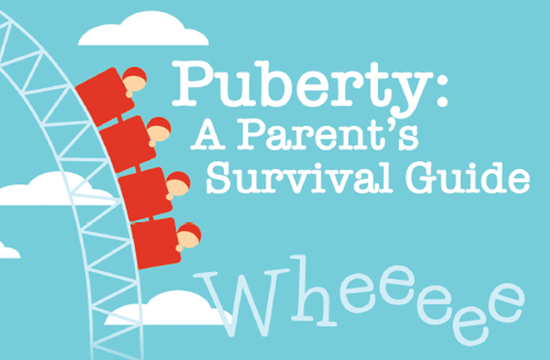By Caitlin Wheeler
No matter how advanced parent are in the 21st century, it’s normal to feel a pang of panic when it comes to talking to your child about puberty and sex. While there is no easy way to broach the subject, preparing for and getting comfortable with having this necessary discussion need not be a dreaded task.By Caitlin Wheeler
How to Ease Your Daughter’s Anxiety
Let her know what to expect. On average, girls start puberty earlier than boys — between ages 8 and 14, with the average age being 11. Consider providing her with a book that might explain the changes, such as “The Care and Keeping of You” by Valorie Schaefer, (American Girl, 1998. Versions are available for ages 8 and older, and ages 10 and older)
Provide her with what she’ll need before she needs it. Give her a care package to keep in her closet and backpack, which could include deodorant, over-the-counter facial washes and creams, pads
(along with tips for how to use them), and remedies for cramping, such as ibuprofen and a hot water bottle or heating pad.
Remind her of the importance of good health and hygiene. Getting regular exercise and eating a healthy diet can help a teen girl feel good about her body, improve her mood and help her focus,
Girls in particular need to get plenty of calcium, Vitamin D and iron.
Be supportive and keep communication lines open. As your daughter’s hormones kick in, her motivations may become more socially focused and her need for independence may increase. Be prepared for mood swings and “attitude” as she deals with shifting hormones.
But remember: You are the adult. Try to keep your cool if she gets frustrated or upset with you. Whether she admits it or not, she needs your support and love.
Know her world. It may be cliché to talk about girl drama, but it is very real. The drama ramps up in sixth grade as girls become more socially aware and friends become central, but by eighth grade they are usually mature enough to overcome their issues,
How to Ease Your Son’s Anxiety
Let him know what to expect. Boys tend to start showing signs of puberty about a year later than girls — between ages 9 and 15, with the average age being 12. Familiarize him with the stages of puberty. Provide him with a detailed and approachable book for boys that explain the changes, like “What’s Happening to Me?” by Alex Frith (Usborne Books, 2006).
Remind him to maintain good hygiene. Boys don’t express the same angst over puberty and body changes that girls do. This lack of anxiety is comforting, but it also means parents may need to nag at sons about showering daily, brushing their teeth and combing their hair until they become habits.
Taking on the Teen Years
Clear things up. Without criticizing your child’s appearance, explain that harmones cause skin changes and acne during puberty and that good hygiene, a daily cleanser or over-the-counter acne treatments can be powerful tools in warding off outbreaks.
Understand teen brain development Teenagers’ brains do not function like adult brains. While the thrill-seeking, risk-taking, peerfollowing part has developed, the reasoning area of a teen’s brain will not fully develop until your teen is in his or her mid-20s. Keep these very natural tendencies in mind as you are telling your adolescent to “just say no.” One way to protect your teen may be to keep him or her as busy as possible with constructive activities.
Make “The Talk” an ongoing conversation. Forget about “the talk.”
Issues associated with puberty and growing up should be part of an ongoing and open discussion — not a single, embarrassingly intense lecture, which puts too much pressure on both you and your child. The best strategy is to be offensive and provide accurate information that reflects your own values.
Being open with young children, and providing them with information that will keep them safe, is absolutely key.
Consider starting the conversation with your child before he or she starts learning about it at school or from social media.
Know what they know. Today’s youth have access to a lot more than the basic “birds and bees” information. “It’s important to bring this up with kids before they see it.
Know your resources. Every child needs someone to talk to as he or she goes through puberty, If you’re uncomfortable doing this, find a trusted friend or family member who isn’t
If a child hides some anxiety inside, then it eats away at them and makes it worse. Make sure they have the information they need to be comfortable with who they are becoming. Empower kids with information they can handle.
Fram It’s NOT the Stork for preschoolers by Robie H. Harris (Candlewick Press, August 2006) to The Teenage Body Book for teens by Kathy McCoy and Charles Wibbelsman (Penguin Random House, August 2016), there are helpful books to read with your child no matter what age you decide to introduce him or her to conversations about puberty and hormones. There are also excellent resources online for teens, such as the Center for Young Men’s Health and the Center for Young Women’s Health.
Finally, remember that it is absolutely appropriate for your child to slowly break away from you, Celebrate this growing independence, while keeping your child safe and informed until he or she has matured enough to move forward without your loving assistance.









